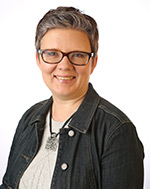Health workers are lifelong learners. It has rarely been so apparent as during the COVID pandemic. Health systems are complex and need to work in unison to deliver critical care. Librarians and information professionals are part of this system, providing essential support for learning in health.
LARK is pleased to announce two presentations on much needed practice-based research related to the provision of learning support in health. What are the essential data skills and learning needs of non-clinical staff? How can information professionals contribute to and enhance systematic review in health? Do interdisciplinary connections enhance learning and practice in health? Answers to these questions are highly relevant to educators and information professionals in other sectors.
Join the Information for Learning, online symposium, on 9 April to hear from our speakers and participate in thought-provoking conversations.
 | |||
Suzana Sukovic
|
Dr Suzana Sukovic (PLC Sydney) and Ms Jamaica Eisner (Deloitte Digital Australia)
Health organisations employ a considerable workforce in non-clinical roles, which are essential for the functioning of health systems. The COVID-19 pandemic has highlighted the critical importance of data-gathering, sharing and communication within health service, and across society. A substantial part of this work is performed by non-clinical staff. A research group at the Health Education and Training Institute (HETI), NSW Health, conducted a study aiming to understand issues of data-use in non-clinical work roles. The study used qualitative and quantitative data-gathering methods to explore the complexity of interactions with data in the workplace. In this presentation, we focus on findings related to data capabilities and support for learning about data. We discuss data and general capabilities, which are often combined with personal traits to enable effective data use in context. Participants discussed and self-assessed a range of skills, identifying their skill gaps and preferred modes of learning. The study findings point towards a need for a holistic approach to data-related workplace learning and information provision. Decisions about training and improvements of work with data need to consider organisational practices, cultures and a range of soft and transferable skills. Study findings have implications for formal education and are applicable in other workplace settings.
Bio notes
Suzana Sukovic (PhD, MA, BAHons) is the Director of Research and Library Services at the Presbyterian Ladies’ College Sydney. Suzana has spent most of her career in education, including secondary, tertiary and workplace education, where she worked in a number of professional, teaching and research roles. Suzana has published papers on issues related to learning and knowledge creation, and on innovation and creativity in knowledge organisations. She also has a long-standing interest and expertise in conducting and promoting research in practice. Suzana combined insights from her academic and practice-based research and experience to publish the first book on transliteracy, Transliteracy in complex information environments. Her current professional interests relate to teenagers’ learning and information behaviours. Her research interests are in the areas of boundary crossing, transliteracy and capability development for lifelong learning. @suzanasukovic on Twitter.
Jamaica Eisner is a content strategist working as a consultant in the Deloitte Digital Sydney practice. She has experience working across government, health, higher education, telecommunications and financial services. Specialist skills include research (qualitative, user research, and socio-cultural), publication (print & digital), web design, and content and communication strategies (e.g. transformational).
 | |
|
Developing a staff mentoring program for systematic reviews
Dr Yulia Ulyannikova and Mr Edward Luca (The University of Sydney Library)
 |
| Edward Luca |
Bio notes
Yulia Ulyannikova has been supporting Medicine and Health disciplines at the University of Sydney Library for the past five years. Her special interests are systematic review support and service improvement with an emphasis on education and mentorship. She holds a Doctoral Degree in History from The University of Melbourne, a Master’s Degree in Information Management from RMIT, and a Graduate Diploma in Higher Education from the University of Sydney.
Edward Luca is a library practitioner and researcher. He is currently Manager of Academic Services (Medicine and Health) at the University of Sydney Library. Edward writes and speaks on topics including design thinking, academic librarianship and scholarly publishing. He is also undertaking his PhD in the discipline of Business Information Systems at the University of Sydney Business School. @edwardluca on Twitter.


No comments:
Post a Comment